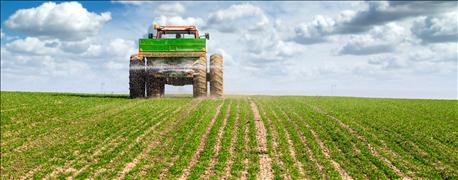
Winter wheat is in better condition than it was a year ago at this time with 59% of the crop rated good to excellent as of Sunday versus 44% a year ago, USDA said in its first weekly national crop progress report of the season.
No corn, soybean or spring wheat planting were reported this week, but corn and spring wheat planting progress will be added to next week’s report.
For the winter wheat there has been concern about the dry conditions in the central Plains and about recent freezing weather there.

USDA Crop Progress Report finds winter wheat is in better condition than it was a year ago at this time with 59% of the crop rated good to excellent as of Sunday versus 44% a year ago. (Photo: oticki/Thinkstock)
Kansas wheat was rated 55% good to excellent, 37% fair, 7% poor and 1% very poor. That is down from 56% good/excellent reading in the state report a week ago, but an improvement from the 46% good/excellent reading last fall as it went into winter dormancy.
Oklahoma wheat as of Sunday was rated 61% good/excellent and Texas wheat was 47%, both of those ratings also are down slightly from recent state reports.
“Hard red winter wheat ratings mostly declined this week, but overall production potential was steady at 807 million bushels,” said Bryce Knorr, Farm Futures senior grain analyst. “In total, the winter wheat crop now looks like it could reach 1.387 billion, with all wheat production of 1.973 billion. Nationwide winter wheat yield potential is from 47.5 to 48 bpa, currently.”
In other areas, “big gains were noted in white wheat, thanks to abundant moisture from El Nino in the PNW. That added 22 million bushels of yield potential according to my model, which stands at 209 million,” said Knorr.
Soft red winter wheat production potential rose by 10 million bushels to 372 million, Knorr said. Missouri, Arkansas, Indiana and Ohio weighed in with decent gains.
Knorr’s production estimates factor in acreage changes from USDA’s March 31 planting report.
“The key is production looks like more than enough to meet demand,” he said.
Click on this link for a pdf with state-by-state maps of historical yields, this year’s crop ratings and yield forecast.
Moisture readings
Topsoil moisture readings indicate rain is needed for Kansas wheat. That state rated 1% surplus, 46% adequate, 40% short and 13% very short for topsoil moisture. Only California and Montana had larger percentages for “very short” moisture and the 40% “short” trailed only New Mexico’s 70%.
Oklahoma topsoil moisture was 3% surplus, 52% adequate, 37% short and 8% very short. In Texas, it was 7% surplus, 46% adequate, 37% short and 10% very short.
Other crop progress
Nationally, sorghum was 13% planted versus 8% a year ago and the 13% average.
Cotton was 3% planted, versus 2% a year ago and the 5% average.
About the Author(s)
You May Also Like




